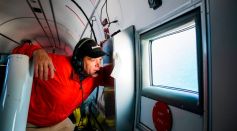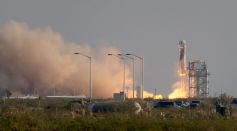Tags: NASA

Hubble, Spitzer Space Telescope Detect Stars Exploding in Hidden Galaxies

NASA Up For New Mission; Its Oceans Melting Greenland Project Begins Final Survey of Glaciers That Flow From Greenland

Jeff Bezos' Blue Origin Says NASA Made The Wrong Decision For Choosing Elon Musk's SpaceX
Beauty After Star Explosions: NASA Shares Photo of 300-Year-Old Cassiopeia A, Supernova Remnant
NASA Reveals International Space Station Tilted 540 Degrees, Far Worse than Just 45 Degrees

NASA Says Tropical Forests Are Now Losing Their Ability to Absorb Carbon Dioxide
Mars Curiosity Rover Detects Whimsical Rocks on Red Planet
Russia Blames Software Error Over ISS Nauka Module Incident; Is It the Most Serious Incident Yet?
Scientists Identify Bending Lights Around Supermassive Black Hole; Study Accidentally Proves Einstein's Theory of General Relativity

NASA Releases New Images of Mars Showing Different Landscapes of the Red Planet

NASA to Launch Boeing Starliner Cargo Spacecraft to ISS; How to Watch Live

NASA-DCOTSS Mission Explores How Summertime Thunderstorms Influence Climate Change Using ER-2 809 Airplane
NASA's Perseverance Rover Reveals First Martian Rock Sampling Location
Russia's Nauka Module Unexpectedly Tilted ISS: NASA Assures No One Was Endangered, Space Station Regained Its Control

World's Youngest Astronomer: 7-Year-Old Brazilian Girl Finds 7 Asteroids for NASA!
Boeing's Starliner Set to Launch this Week: Here's How to Catch its Orbital Test Flight
NASA's Apollo 15 Mission: First Space Car Celebrates 50th Anniversary

Russian Pirs Module Finally Detaches From ISS; Burns Up in Earth's Atmosphere
NASA's Ingenuity Mars Helicopter Has Now Flown Over One Mile, Capturing Images to Help Perseverance Rover

Artificial Intelligence Improves NASA's Sun Images, Solar Dynamics Observatory Says
Most Popular

Can Tesla Solar Roof and Powerwall Fully Power Your Home with Reliable Energy?

Inside Snow Clouds: How Ice Crystals Form and Create Heavy Winter Snowfall Patterns

Carbon Sequestration Explained: How Trees Fight Climate Change and Build Long‑Lasting Forest Carbon Stores

Newly Discovered Planet That Literally Rains Diamonds Across Its Surface





